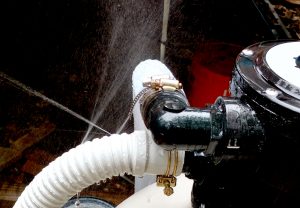No matter how healthy your pool is—or how new it may be—pool ownership is costly. However, when you have a problem, such as a leaky pipe—those maintenance costs can go well beyond your means if left untreated. This article will cover how to troubleshoot, and treat your leaky pipe, so you can swim stress-free all summer long!
The Biggest Problem About a Leak
 If you’re a U.S. pool owner, there’s a good chance your pool takes up roughly 20,000 gallons of water—which means that when you have a leak, it’s not always easy to detect. In fact, tracking the source of many leaks involve costly dye methods and underwater listening tools. The good news is, the majority of leaks exist in the above-ground pipes. Here are two important questions to ask yourself which can clue you in to a leaking pipe:
If you’re a U.S. pool owner, there’s a good chance your pool takes up roughly 20,000 gallons of water—which means that when you have a leak, it’s not always easy to detect. In fact, tracking the source of many leaks involve costly dye methods and underwater listening tools. The good news is, the majority of leaks exist in the above-ground pipes. Here are two important questions to ask yourself which can clue you in to a leaking pipe:
- Are you losing water without an explanation? Although there can be many reasons you could be losing water, a leaky pipe is one of its greatest culprits! To rule out evaporation and other water loss issues, try this test: fill a pail with water, and mark its starting level, as well as marking the level of water in your pool. Compare these two levels 24 hours later. If the pool water level has dropped lower than the water pail level, you may have a pipe leak.
- Is your pool leaking water when the pump is on and circulating? Is your pool looking cloudy these days? If so, a leaky pipe may be to blame. Leaks can range from slight seepage to high powered sprays, causing a loss of clean water which may originate from the filter valve. You may also have a leak when the pipe is turned off, as water can leak out of its opening when the cycle has stopped.
There are many symptoms that can additionally help you gain insight towards a leak in your pipe/plumbing system. They include:
- Cloudy pool water
- Lower flow rate
- Loose pool pump (it wiggles at the touch)
- Nothing happens when you turn your pool pump on
- When the pool pump starts up, it struggles to move water
- The filter pressure is lower than usual.
The Easiest Way to Fix Your Leak
If you have a leak (or presumed leak), contact your local pool professional right away. They can answer all of your questions, as well as determine what type of leak you have. By acting on a leaking pipe today, you can save money in the long run when problems arise, and enjoy your pool with the pace of mind that you’re an efficient and responsible pool owner!




